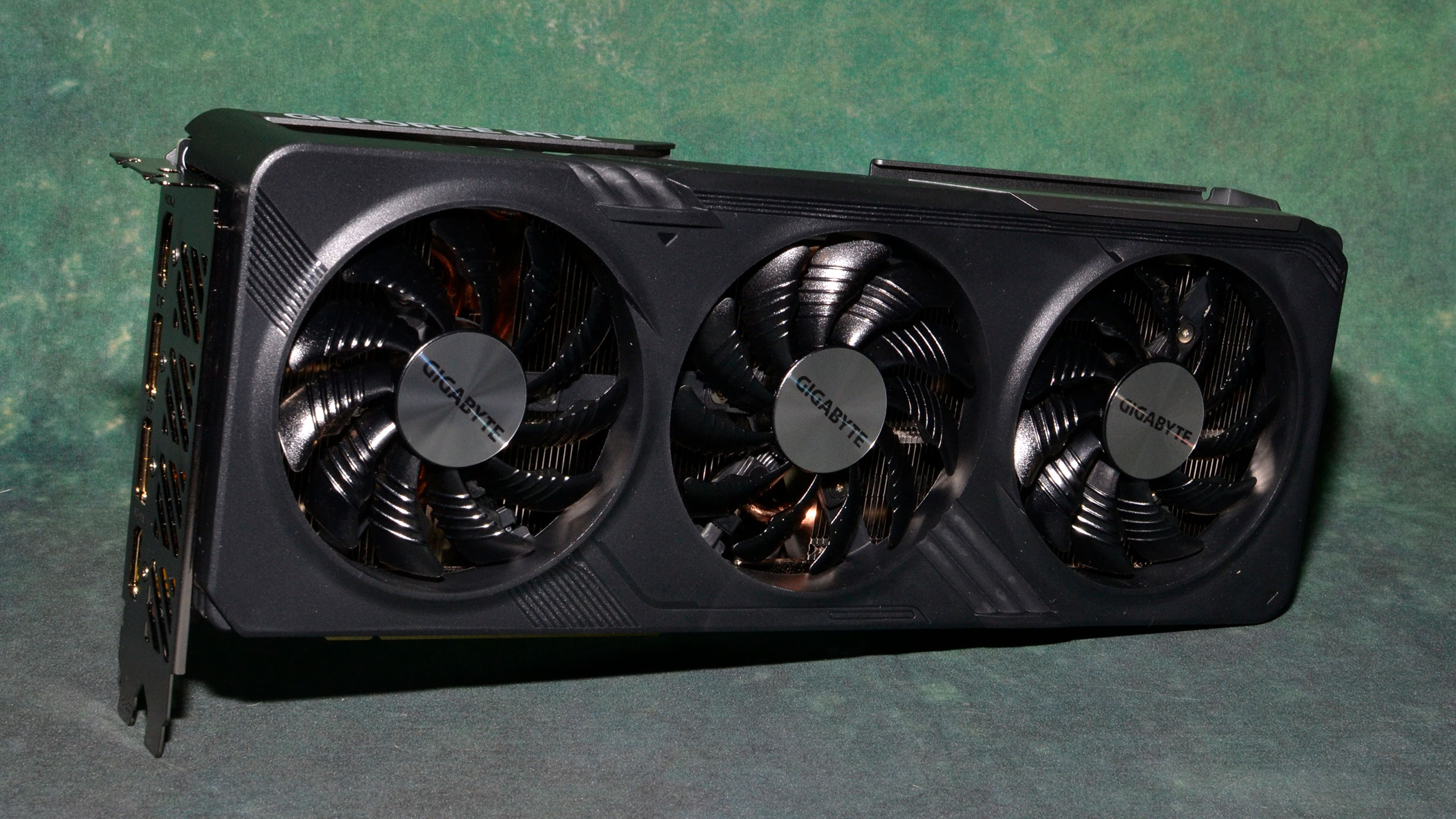Why you can trust Tom's Hardware
Nvidia RTX 4060 Ti 16GB AI Performance
GPUs are also used with professional applications, AI training and inferencing, and more. Along with our usual professional tests, we've added Stable Diffusion benchmarks on the various GPUs. AI is a fast-moving sector, and it seems like 95% or more of the publicly available projects are designed for Nvidia GPUs. Those Tensor cores aren't just for DLSS, in other words. Let's start with our AI testing and then hit the professional apps.
We're using Automatic1111's Stable Diffusion version for the Nvidia cards, while for AMD we're using a recent Nod.ai Shark variant — we retested the AMD cards for this review using build version 20230713_819 for testing, as results have improved substantially compared to our previous testing. The Nvidia GPUs were tested after replacing the default CUDA DLL files with newer versions, as recommended by Nvidia.
Intel meanwhile has finally added an OpenVINO fork of Automatic1111's webui, which shows about a 50% improvement over our previous testing. Except, we had to run with the Stable Diffusion v1.5 model as the v2.1 model (base and otherwise) didn't work or generated garbage outputs. Also, going beyond a 720x720 resolution on the A770 16GB card resulted in various problems (this is a known issue), so we still don't have 768x768 results for Intel's GPUs.
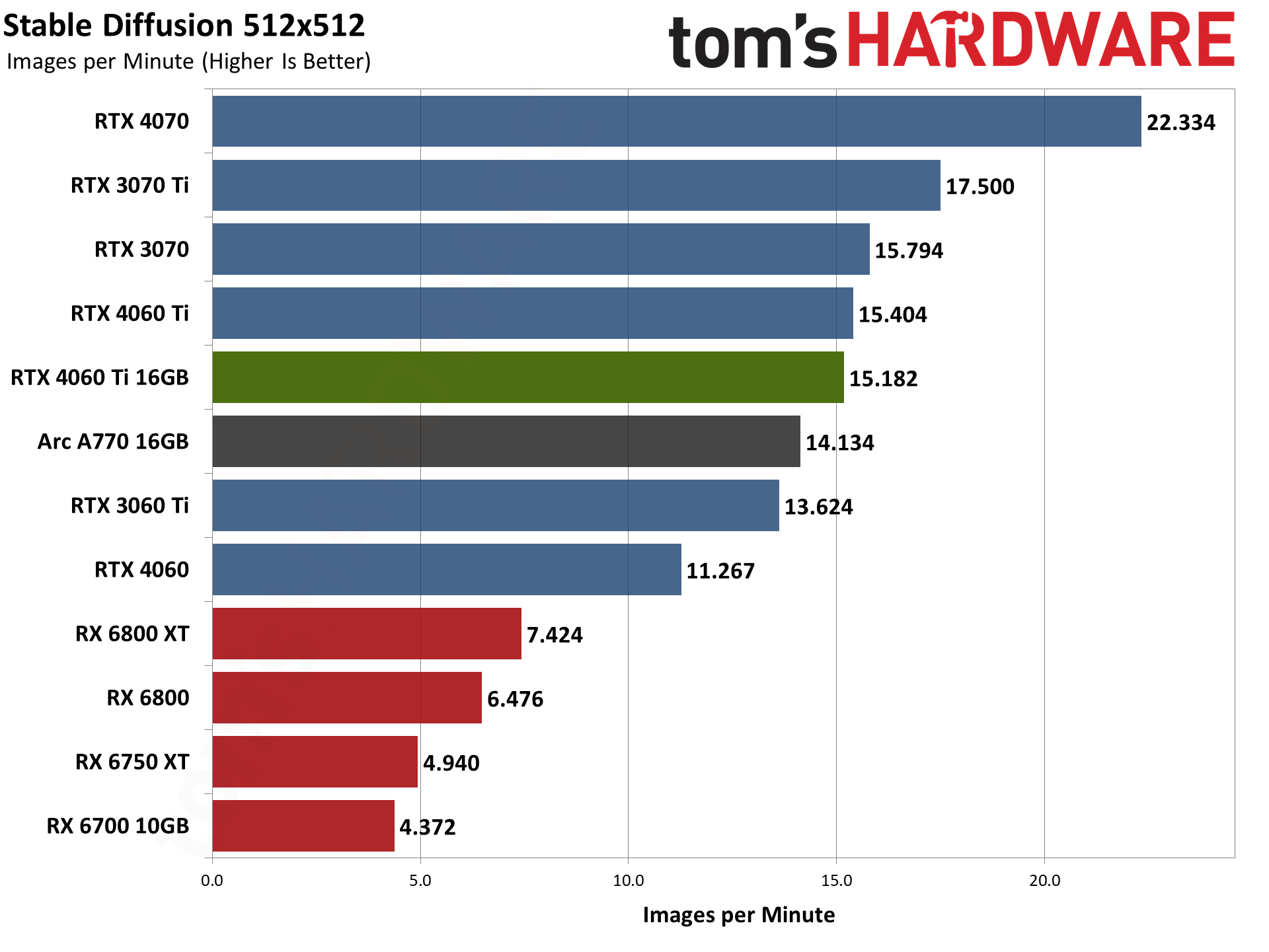
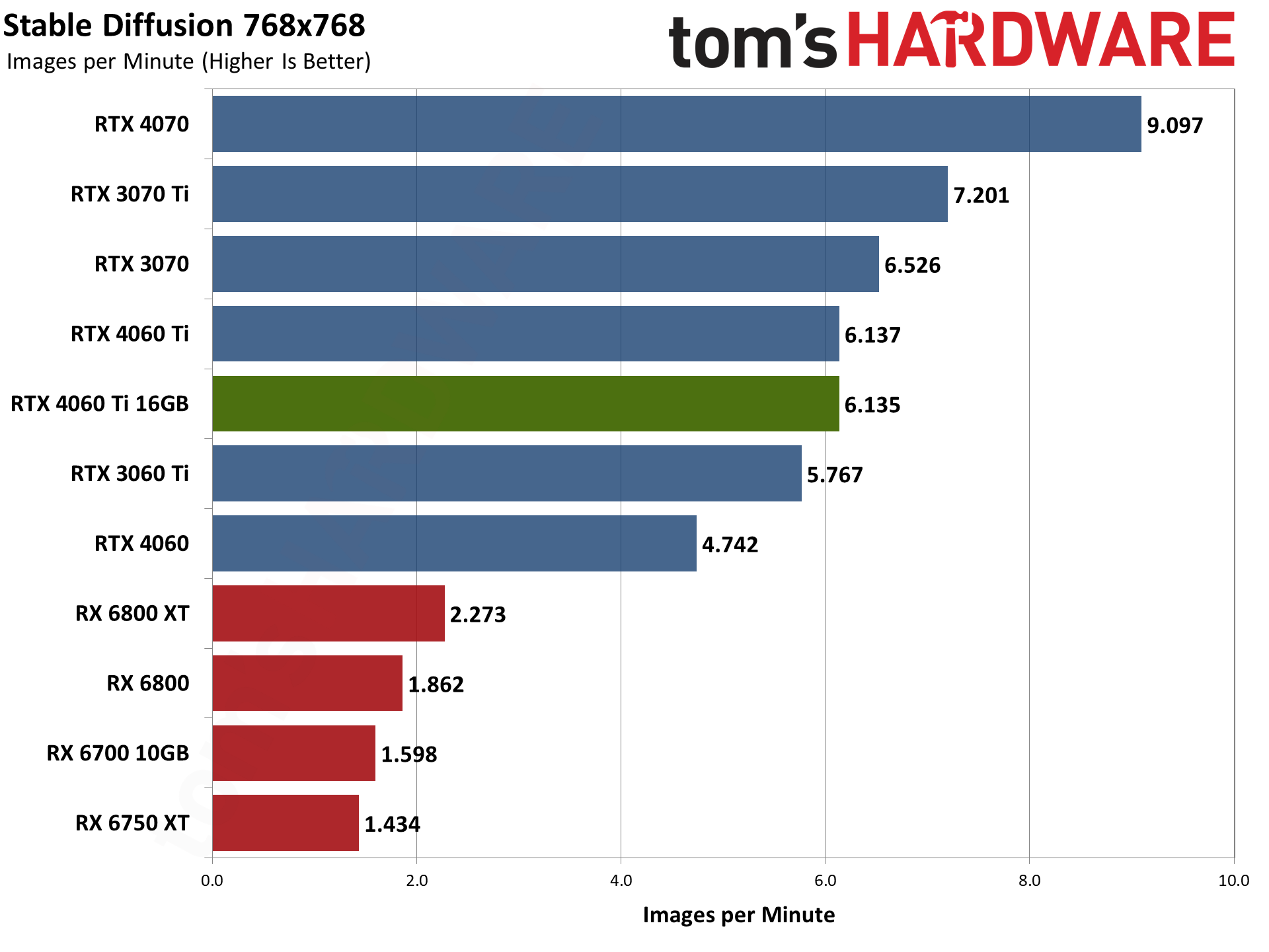
While the AMD and Intel GPUs improved in performance, the overall standings remain unchanged. Nvidia's RTX GPUs rank at the top, with the Arc A770 16GB landing just behind the 4060 Ti now, and AMD's GPUs occupy the bottom portion of the charts. Note that we haven't seen any major improvements in Nvidia GPU performance since our previous testing, so other than adding tests with the 16GB card, those results haven't changed.
As we saw with many of the gaming benchmarks, the new 4060 Ti 16GB often falls behind its 8GB sibling. Whether that's due to the difference in cards, VBIOS, VRAM, or something else isn't clear. We'll see on the next page that, despite the higher boost clocks on specs, the Gigabyte card actually runs at generally lower clocks than the 4060 Ti Founders Edition, and that could explain the minor gap in performance.
There are other AI workloads, some that utilize very large LLMs (Large Language Models). ChatGPT and its ilk for example need hundreds of gigabytes of memory. Locally running chatbots meanwhile often have to sacrifice quality due to VRAM constraints. It's harder to quantify how much doubling the VRAM can help, but the 16GB card at least has the option to use larger models. That's a pretty niche market, but if you want an Nvidia card with 16GB or more VRAM, most other qualifying GPUs cost twice as much as the 4060 Ti 16GB.
Nvidia RTX 4060 Ti 16GB Professional Workloads
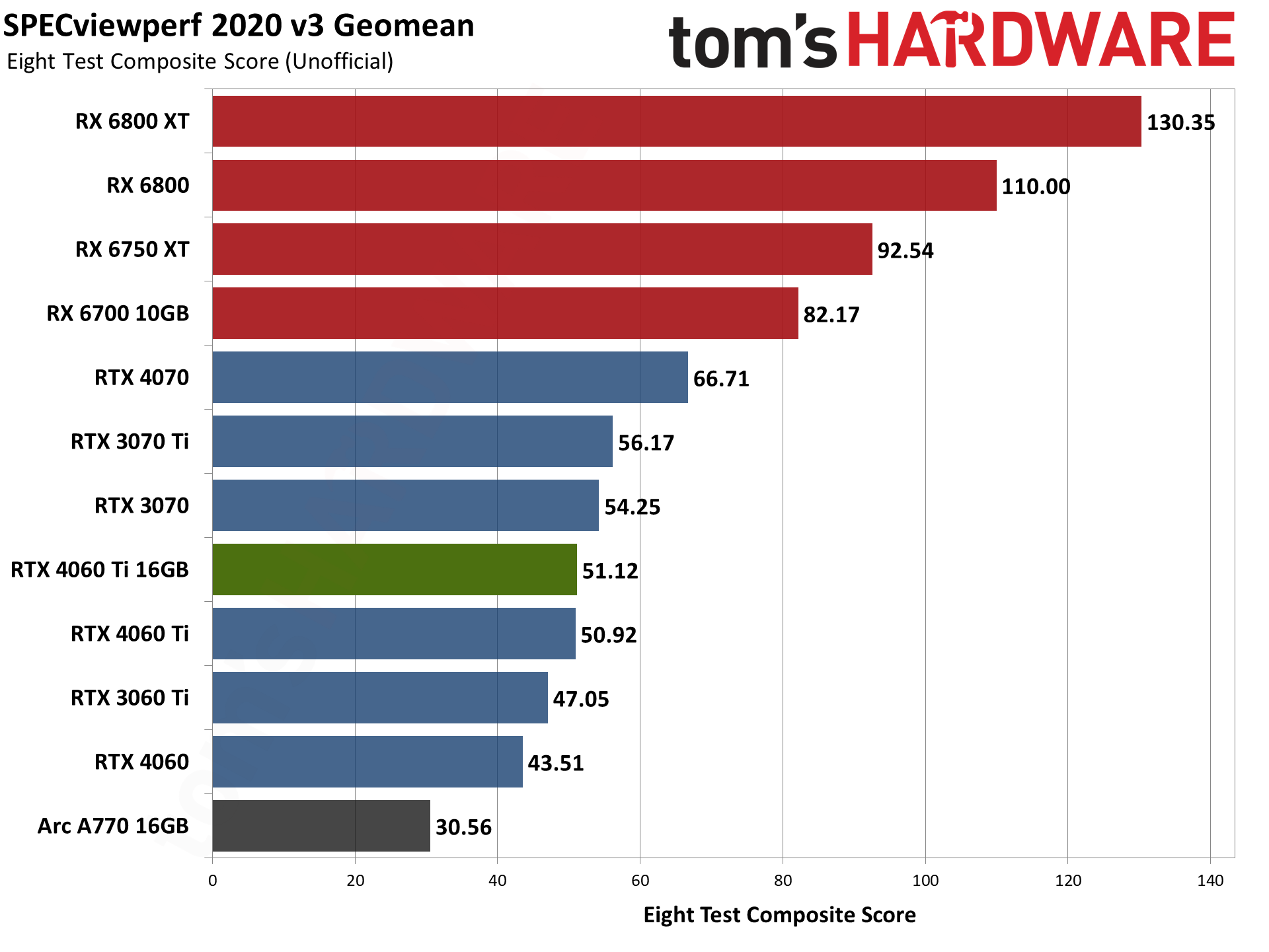
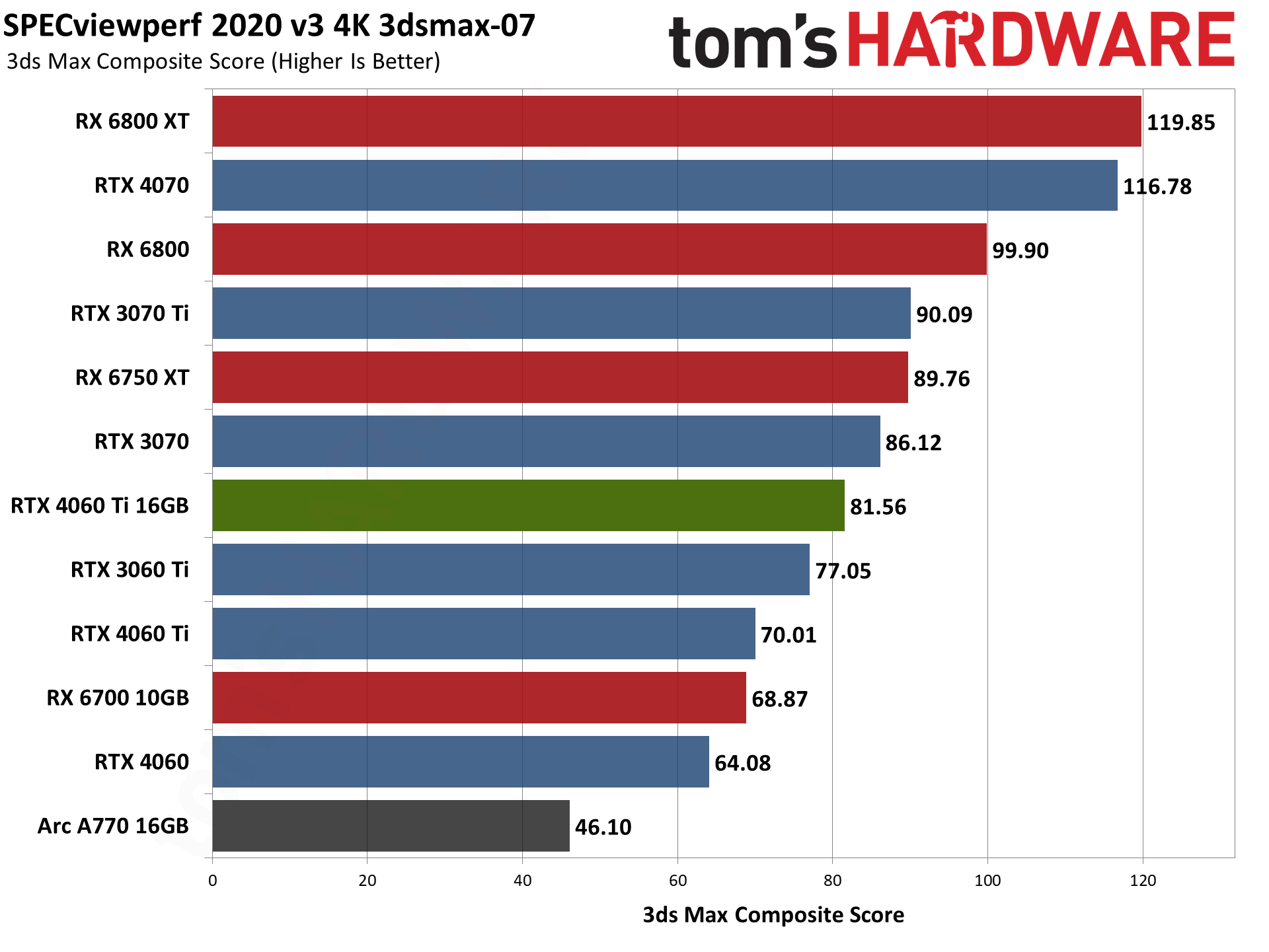
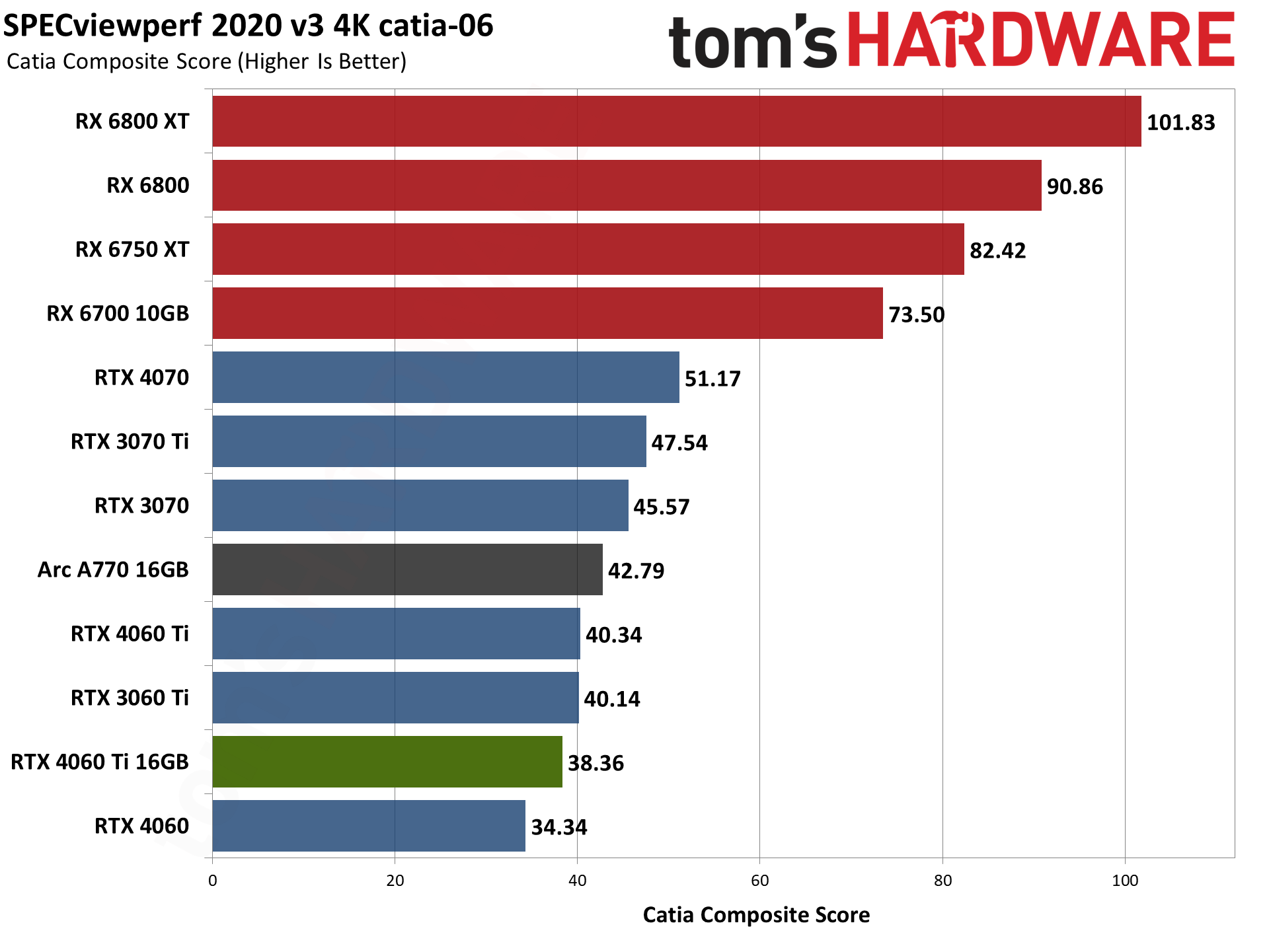
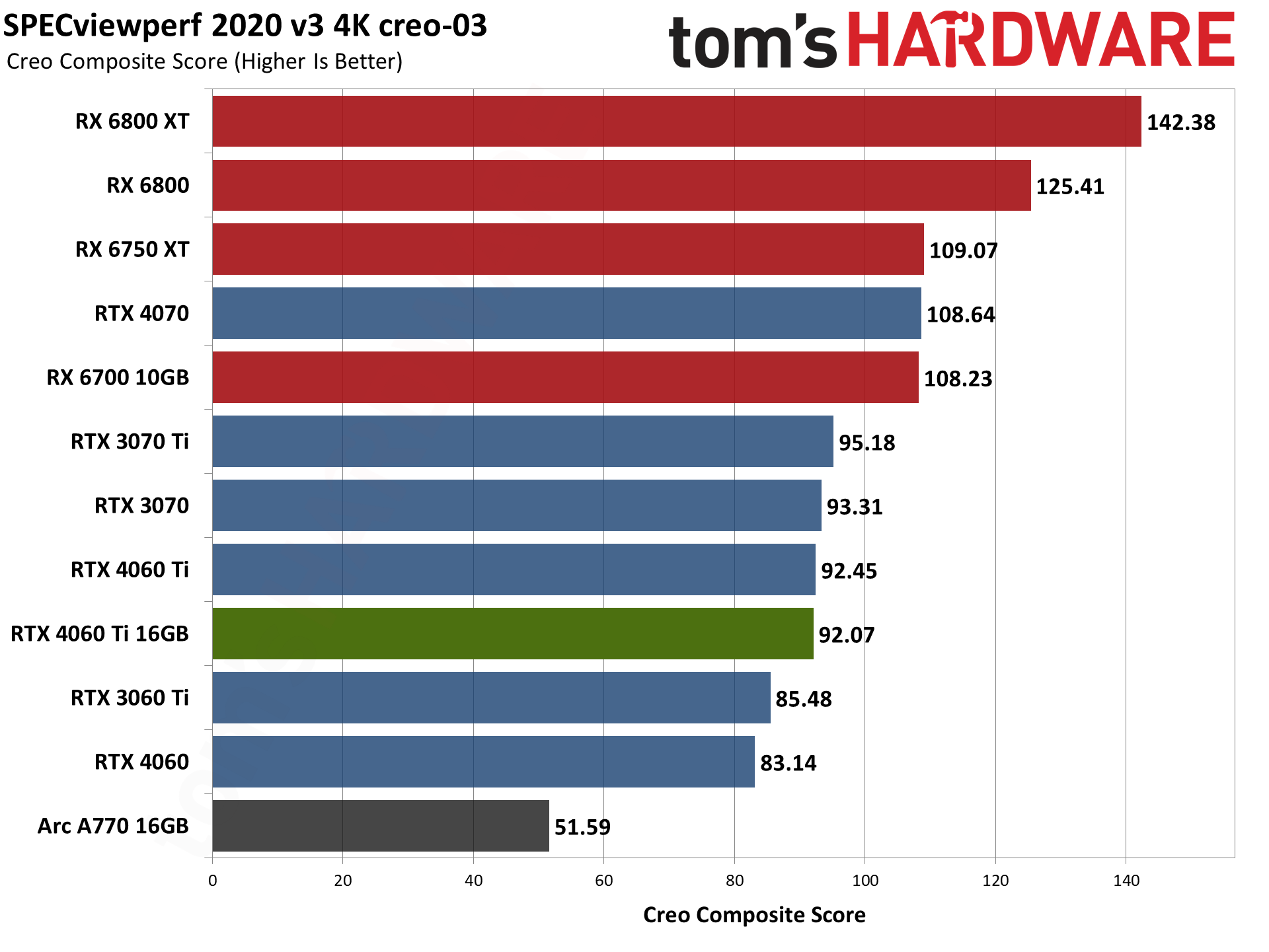
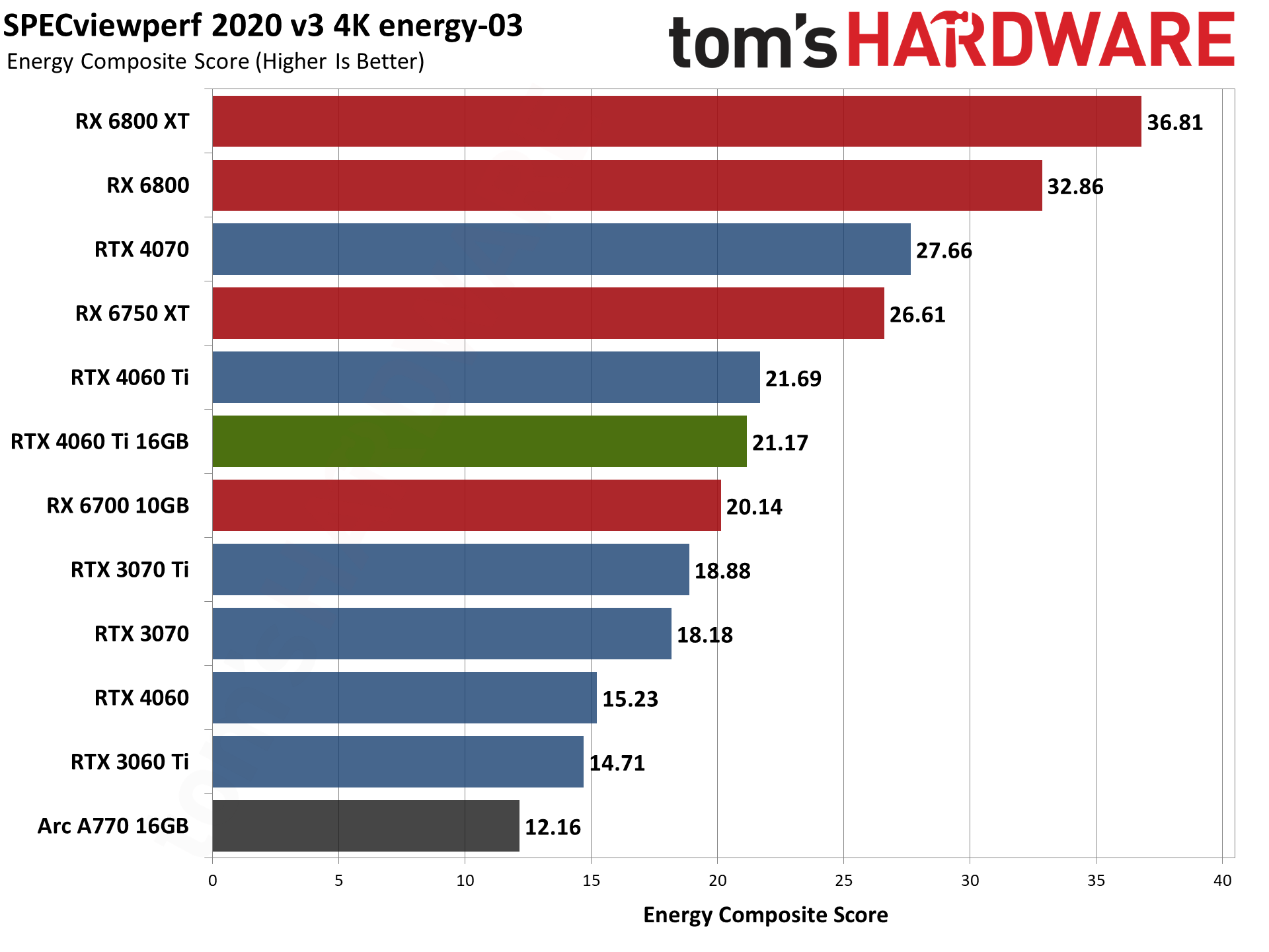
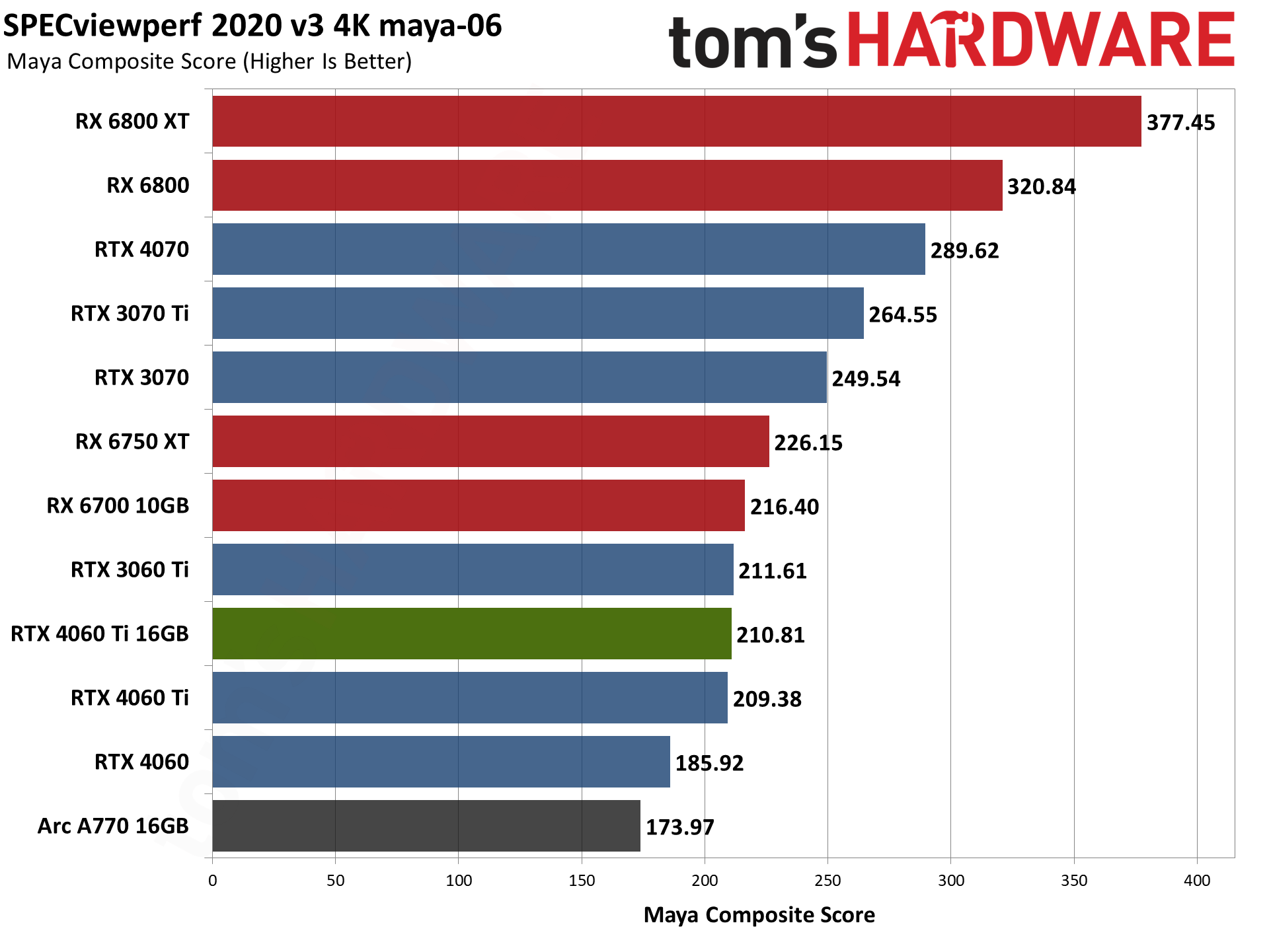
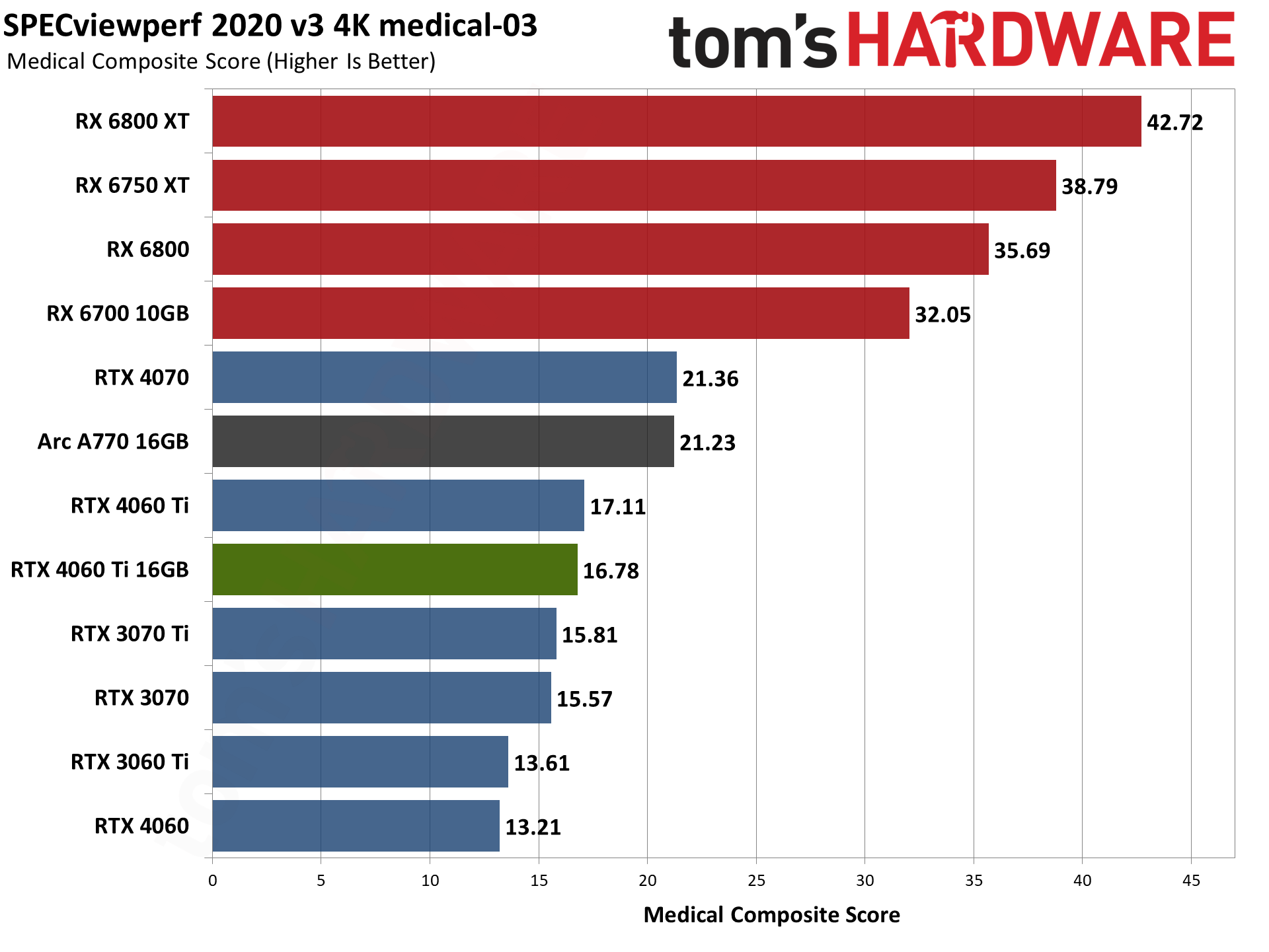
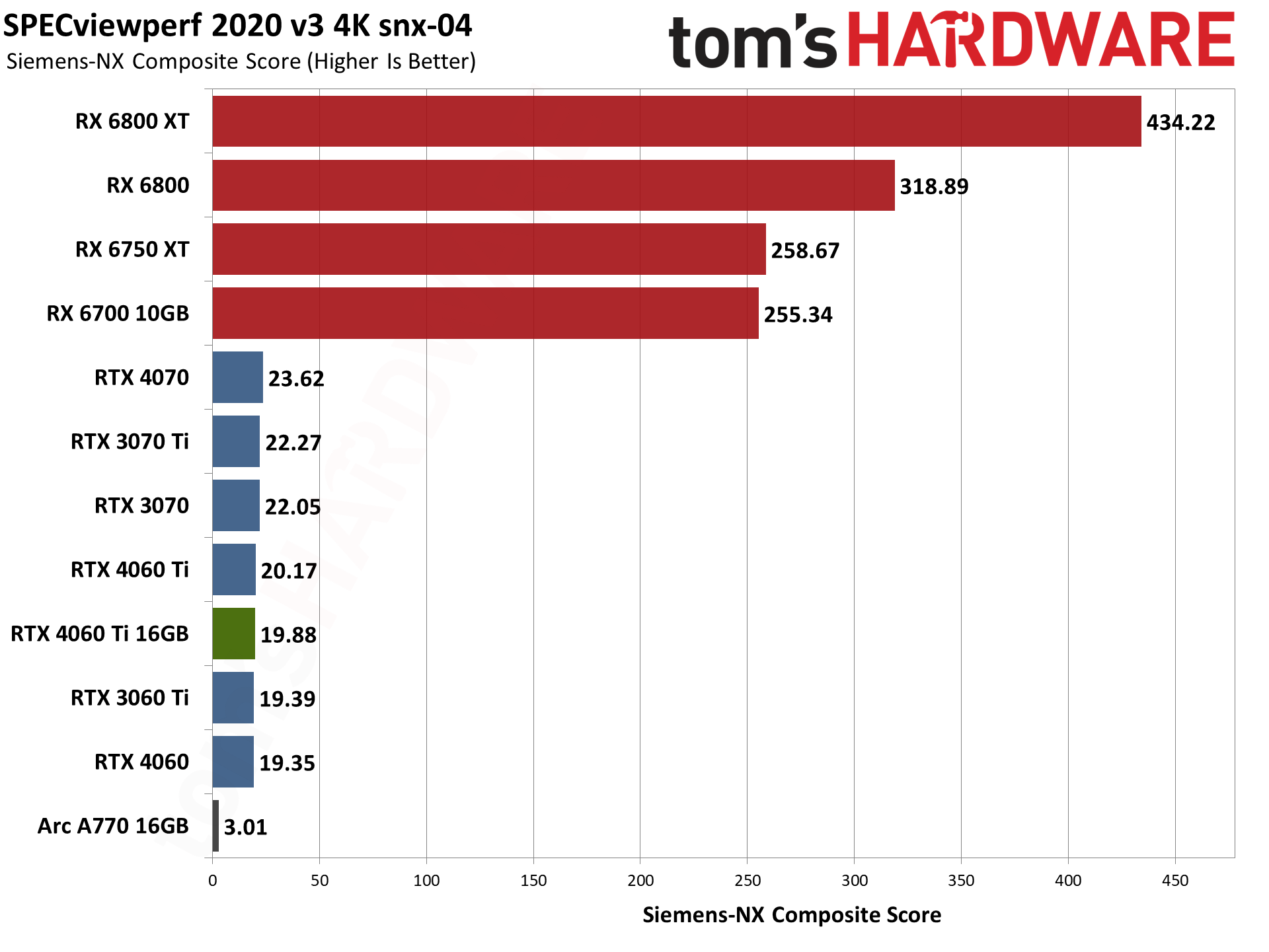
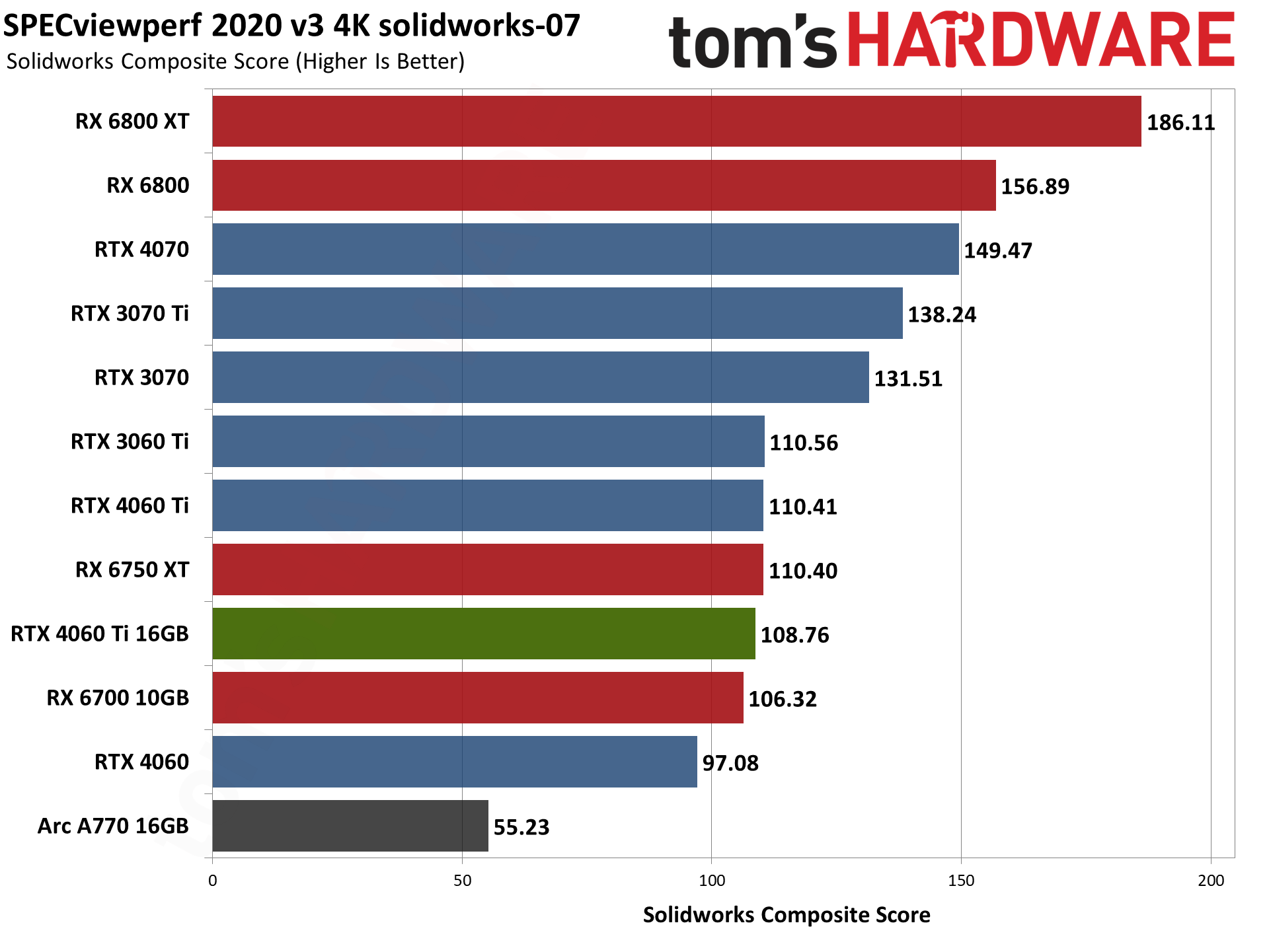
SPECviewperf 2020 v3 consists of eight different benchmarks, and we use the geometric mean from those to generate an aggregate score. Note that this is not an official score, but it gives equal weight to the individual tests and provides a nice high-level overview of performance. Few professionals will use all these programs, however, so it's often more important to look at the results for the application(s) you plan to use.
Nvidia's RTX 4060 Ti 16GB generally matches the 8GB, as expected. There's one instance where the added memory does seem to help: 3dsmax-07 has the 16GB card performing 16.5% better than the 8GB card. Most of the remaining tests slightly favor the 8GB model, due once again presumably to the slightly higher boost clocks. Generationally, it's also worth noting that the RTX 3070 still typically beats both 4060 Ti variants.
If you're looking to use consumer hardware on these apps, AMD's GPUs generally provide a much better value. They likely wouldn't match actual professional GPUs running the pro / Studio drivers in some tests (i.e. something like the AMD Radeon Pro W7600), but there's not a single case where the RTX 4060 Ti 16GB can beat the RX 6750 XT, never mind the RX 6800 and RX 6800 XT.
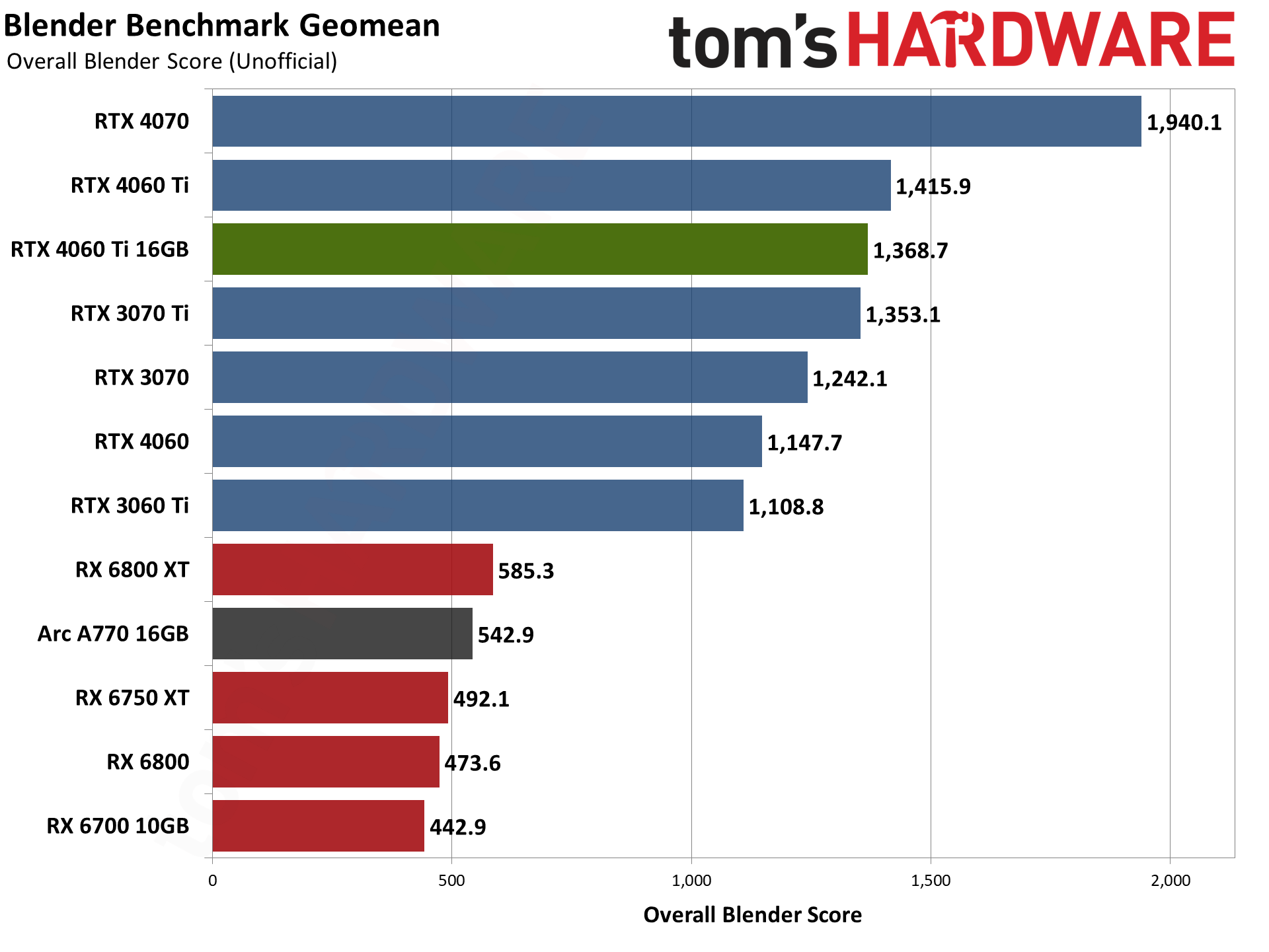
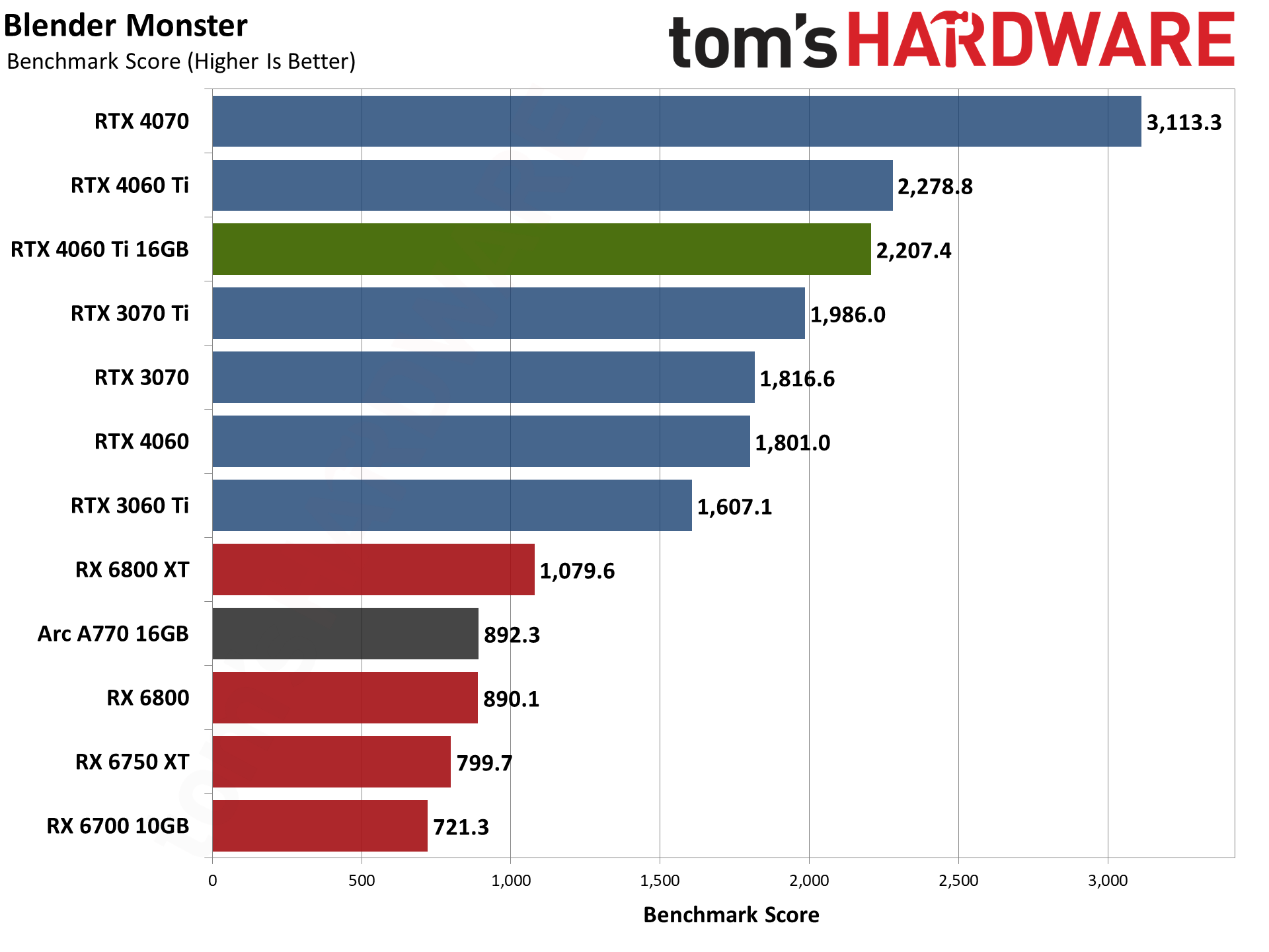
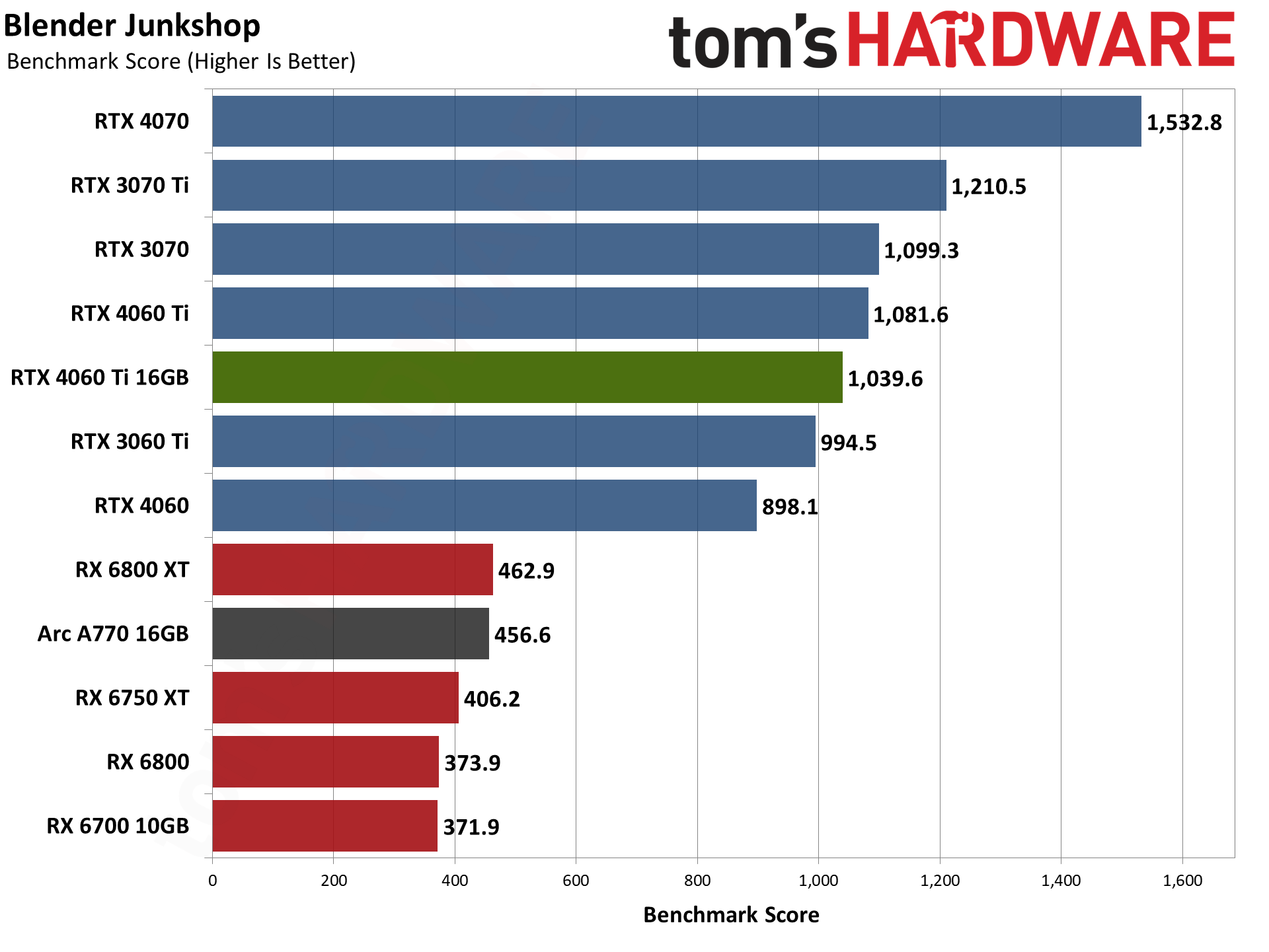
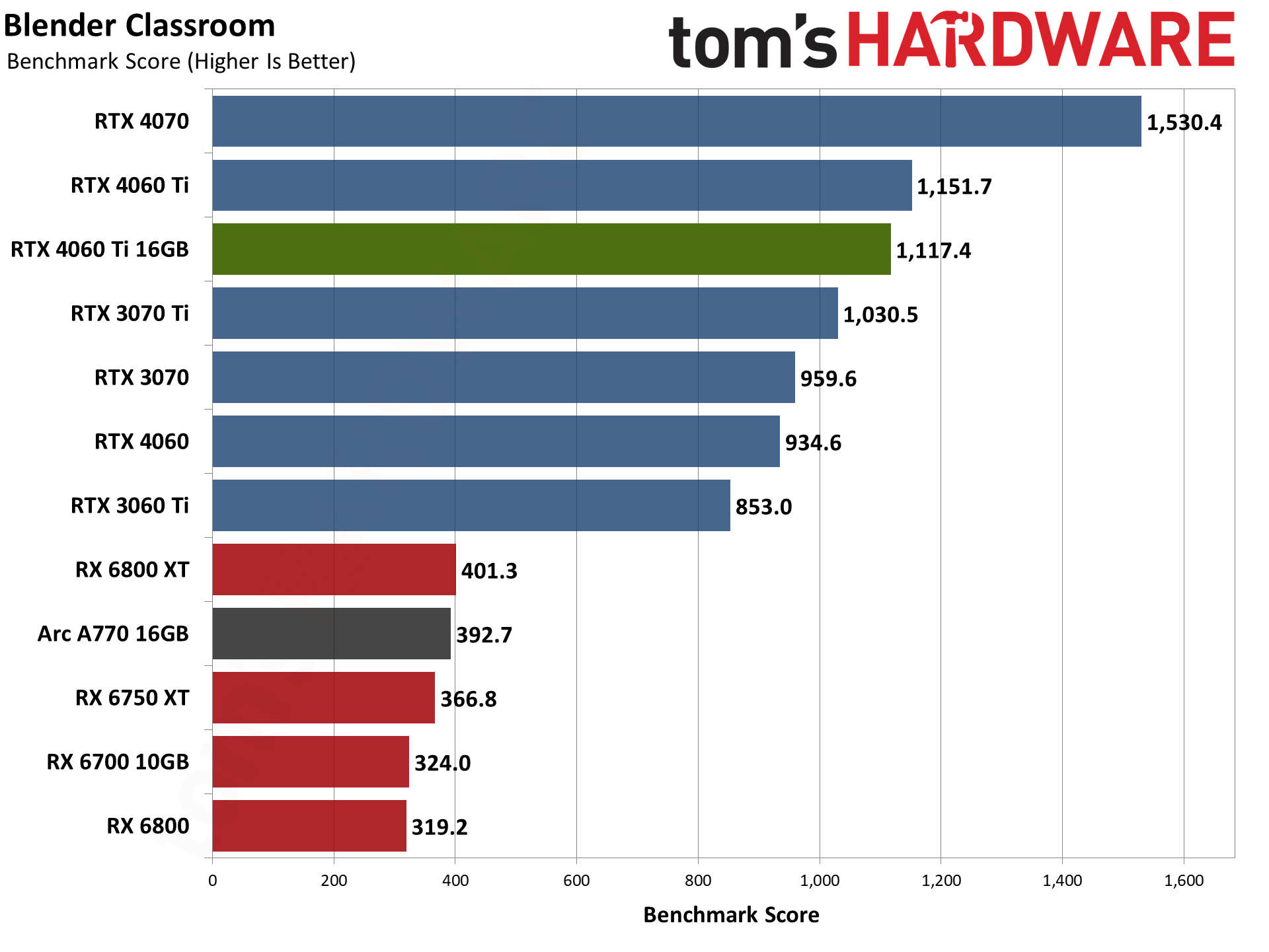
Moving on to 3D rendering, Blender repeats the same story we've seen throughout this review. The RTX 4060 Ti 16GB comes in slightly behind the 8GB card, though this time it's at least able to surpass the RTX 3070 by 10%, and it's 2.35 times as fast as the RX 6800 XT. As good as the AMD GPUs look in SPECviewperf, then, they look equally poor in Blender.
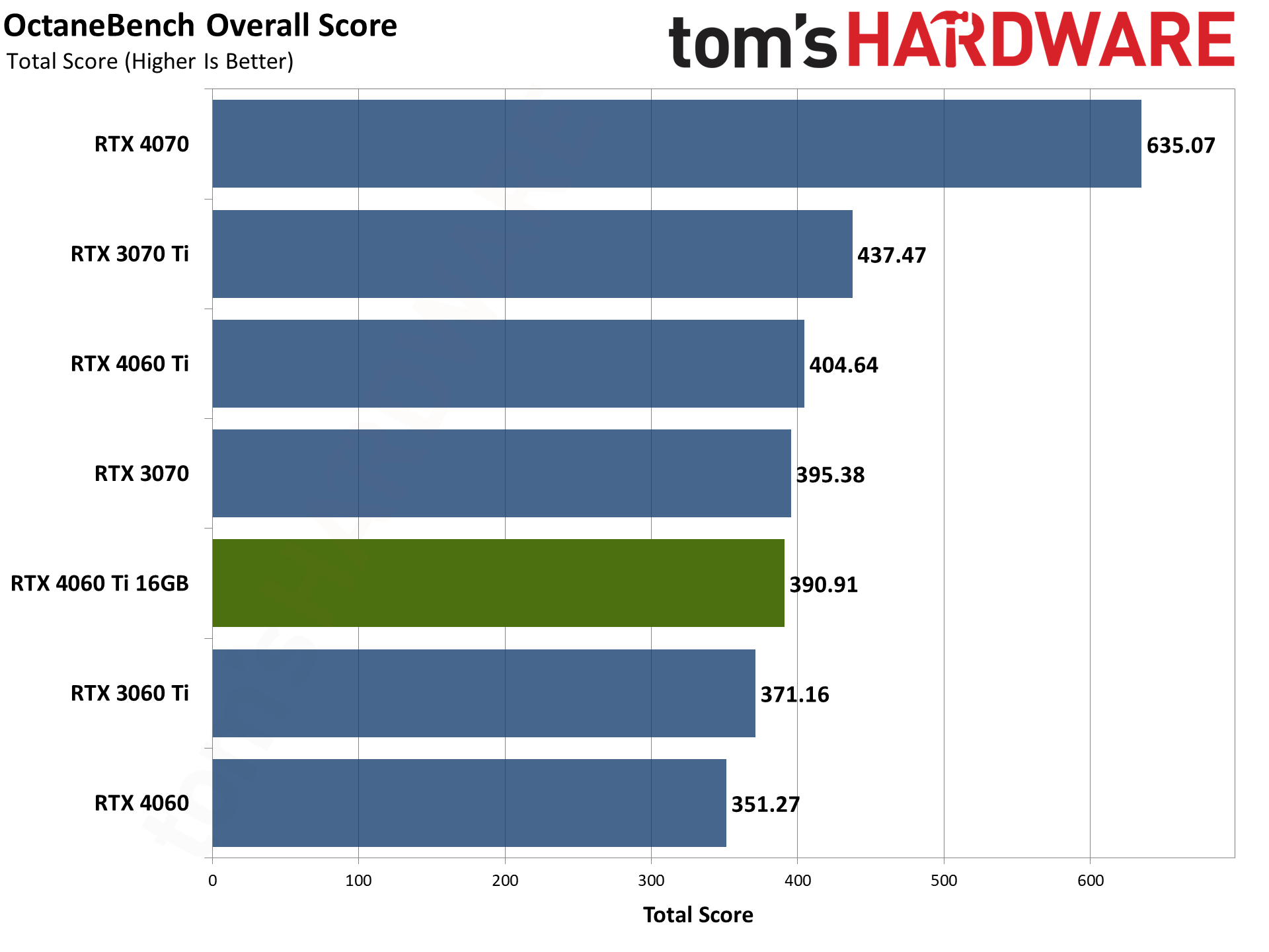
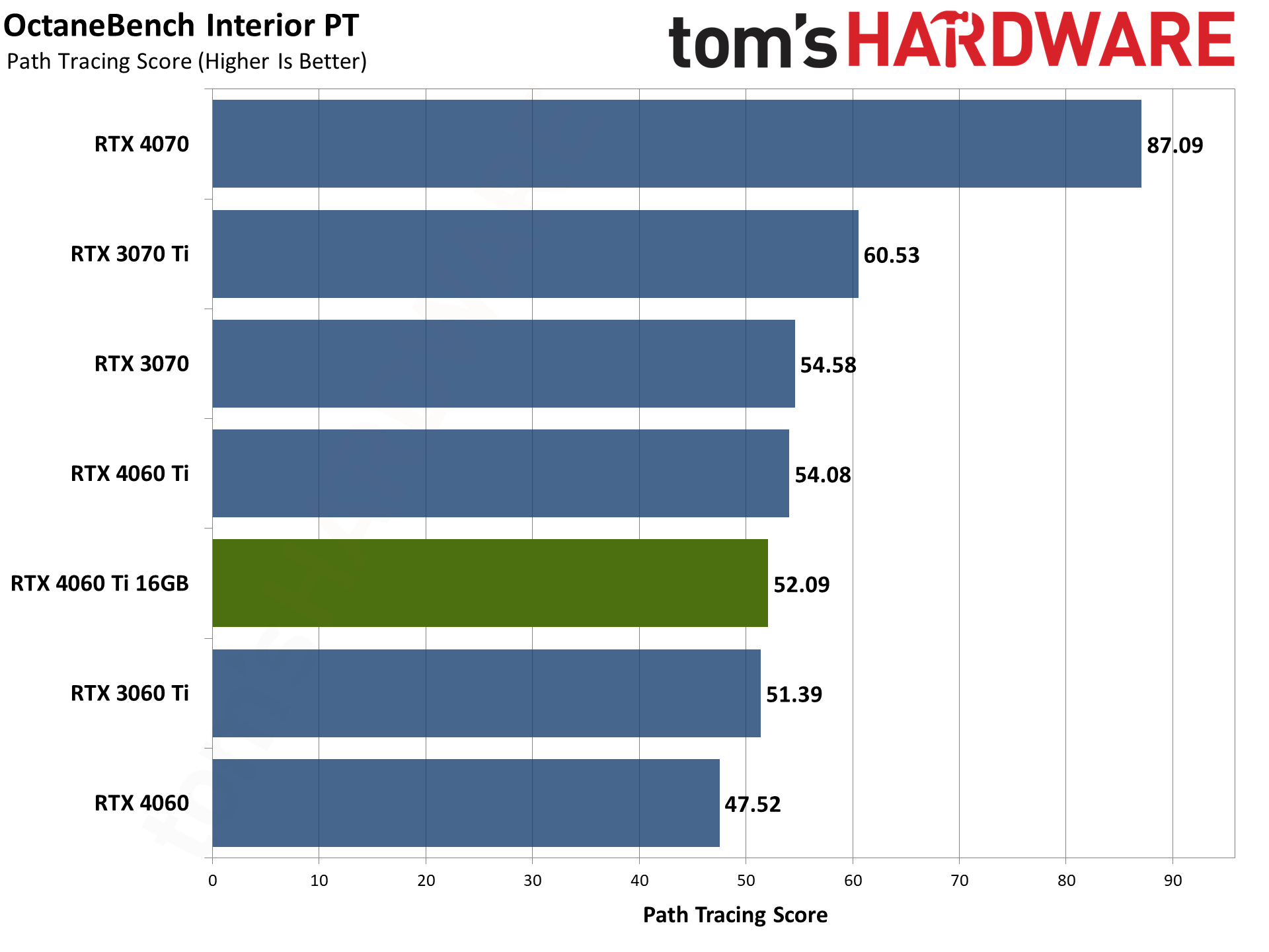
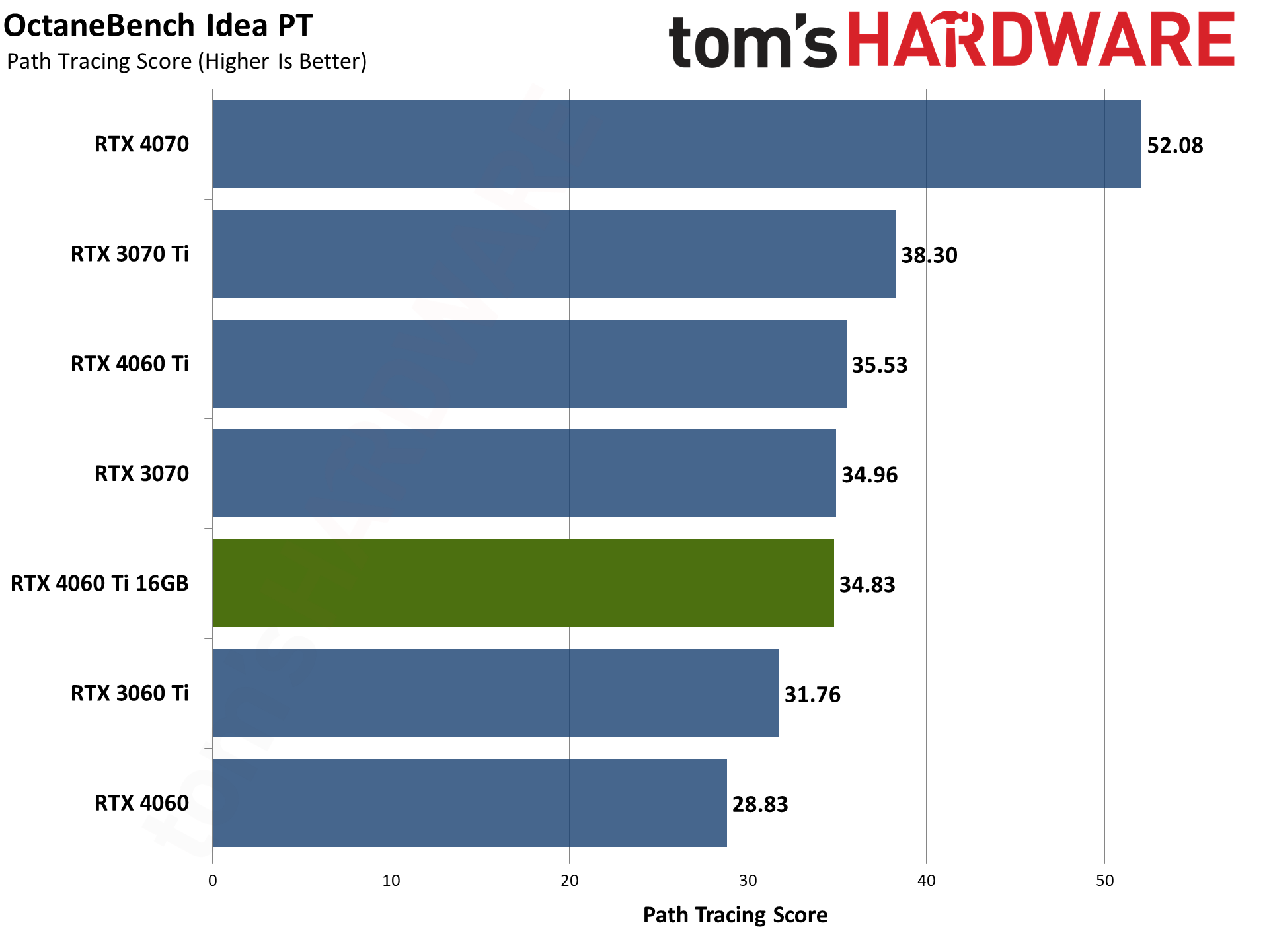
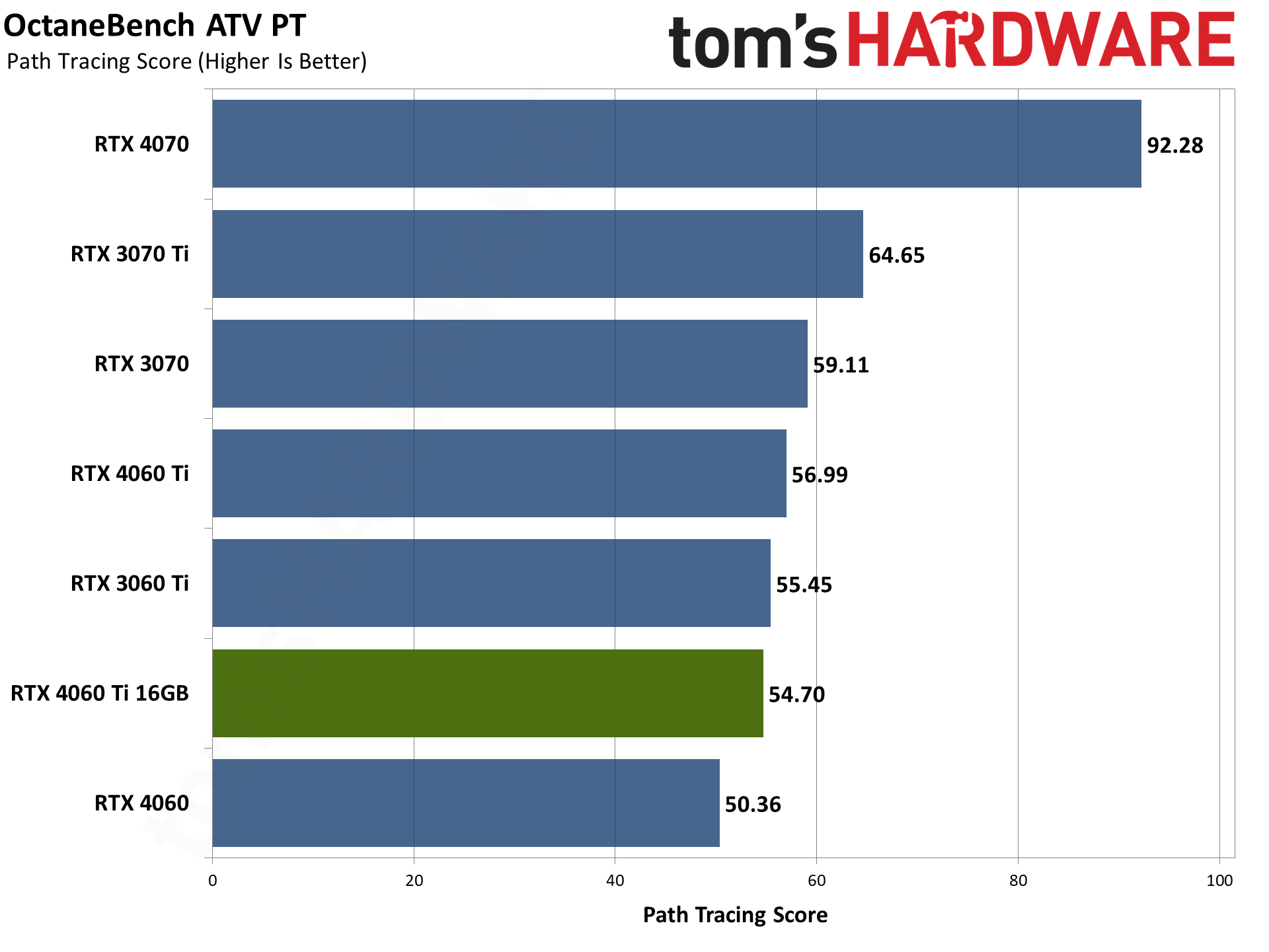
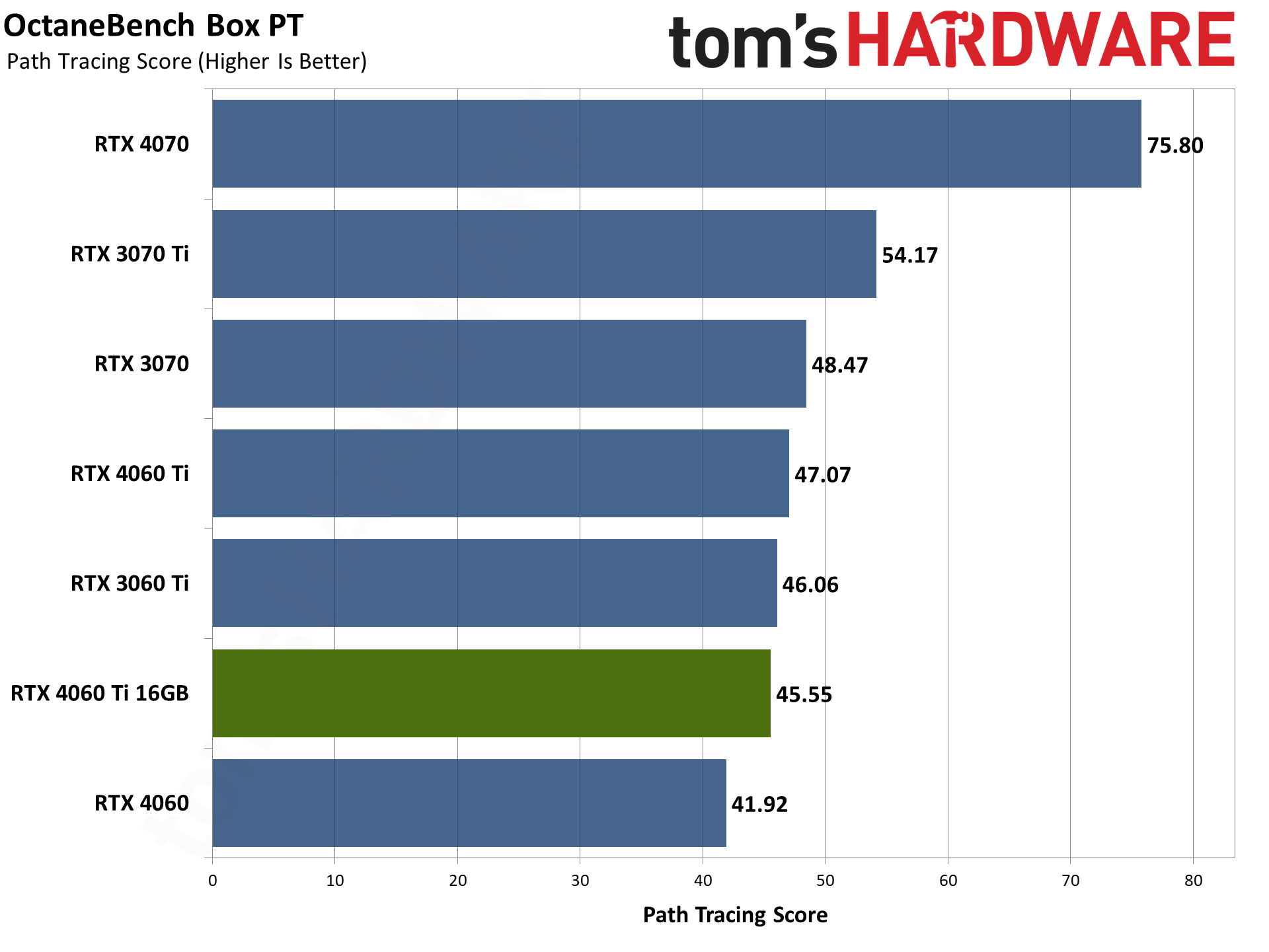
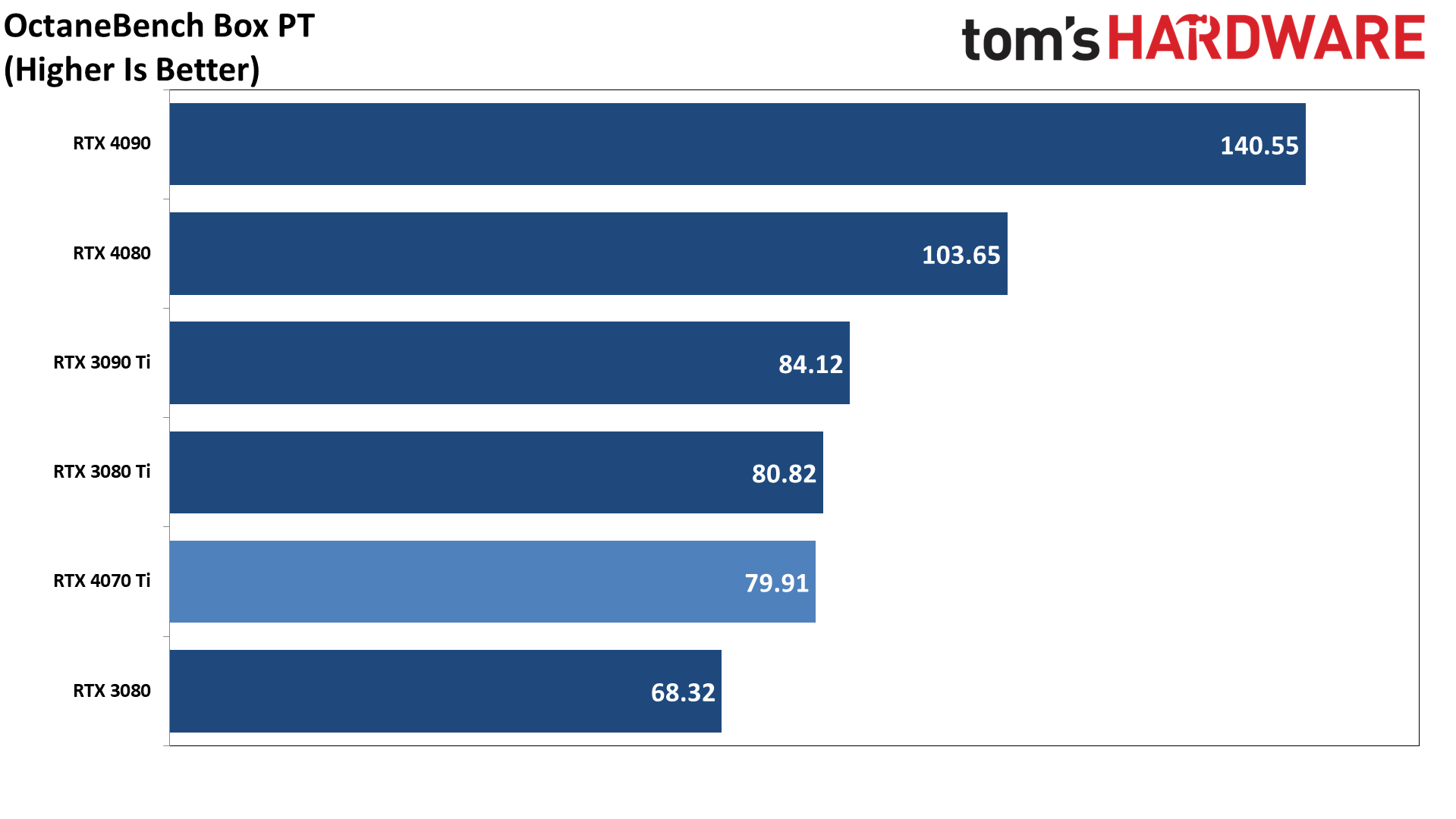
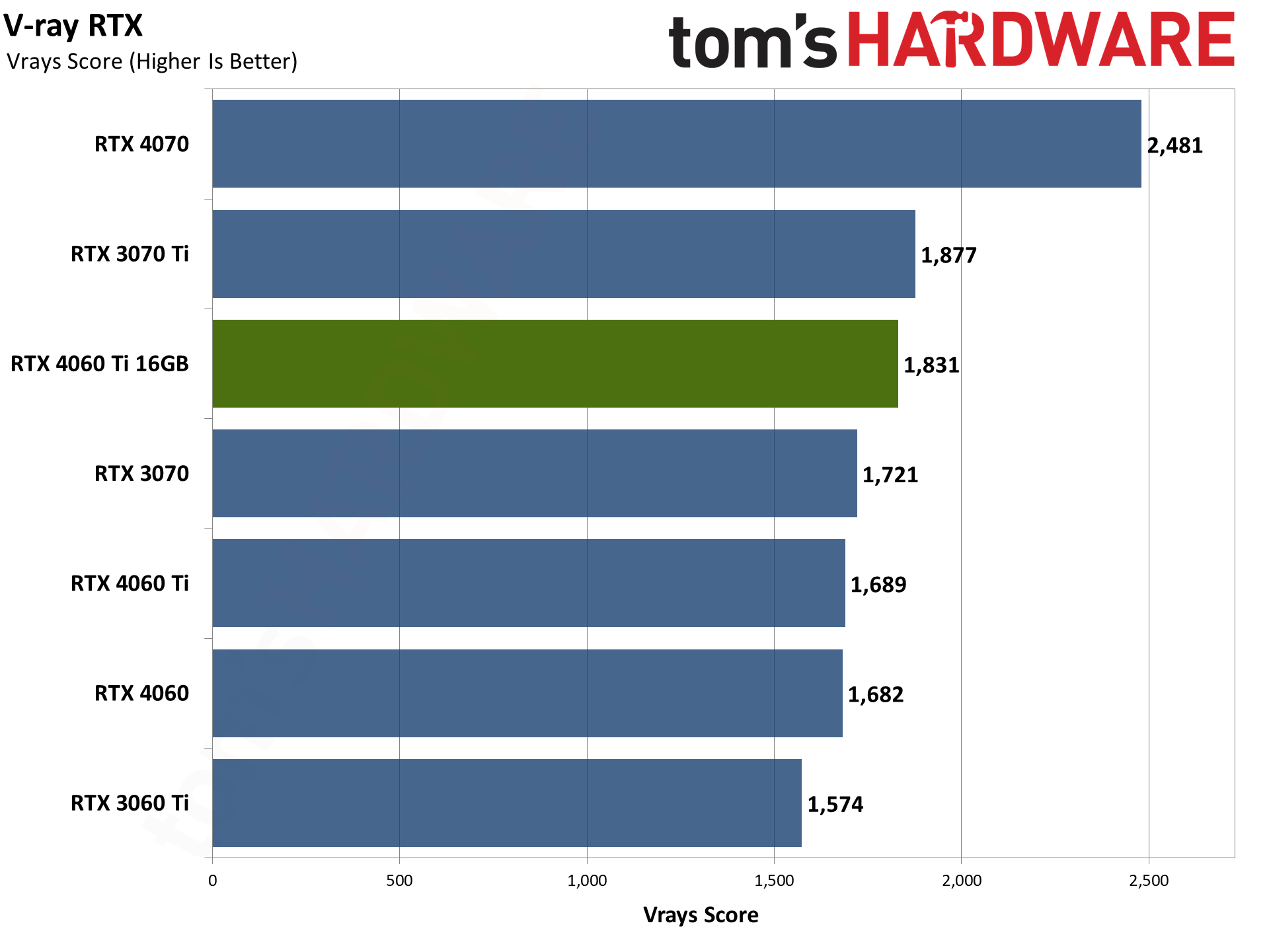
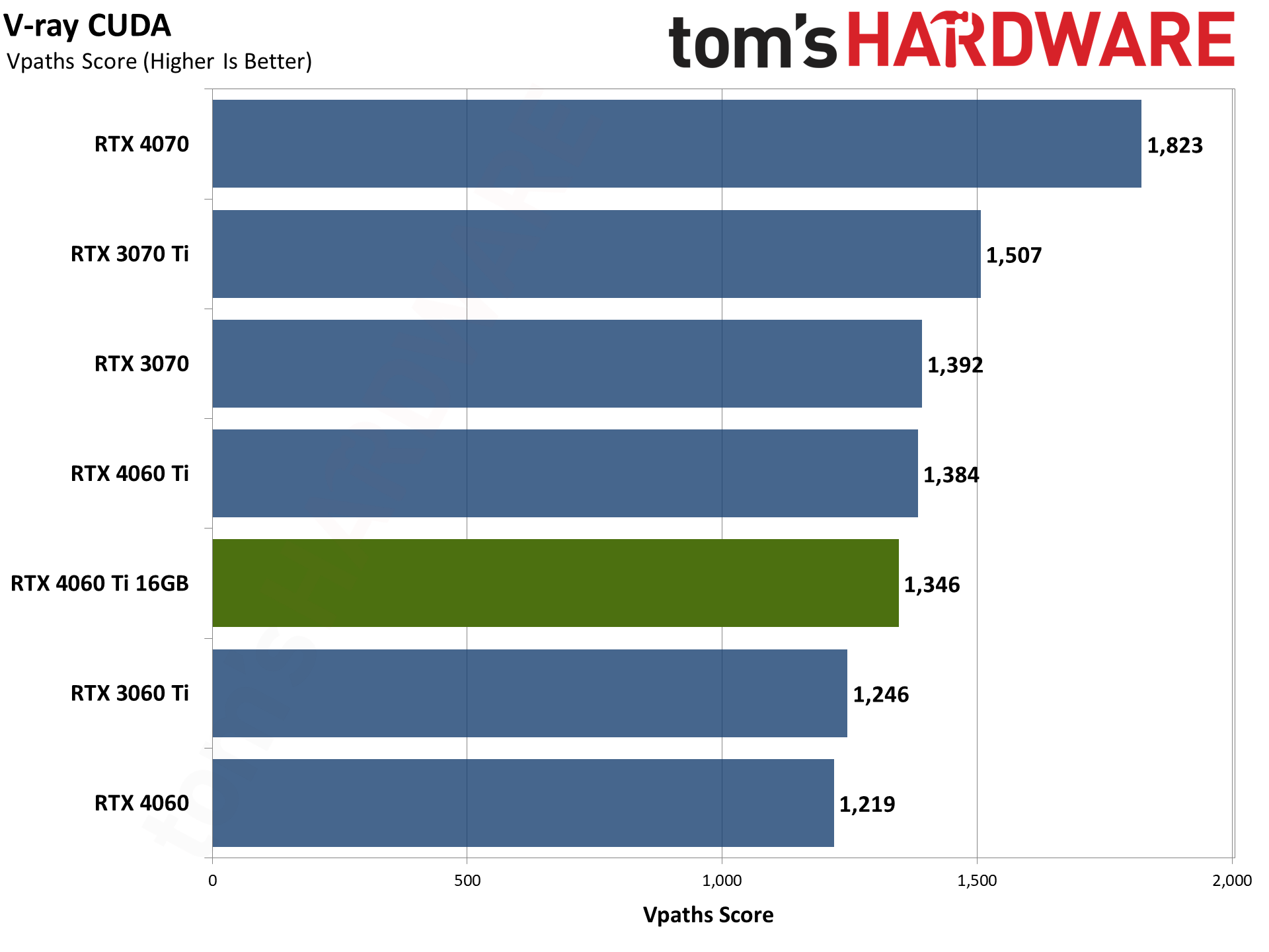
Our final two professional applications only support ray tracing hardware on Nvidia's GPUs. OctaneBench puts the RTX 4060 Ti 16GB a few percent behind the 8GB card as well as just behind the RTX 3070, yet again. V-ray on the other hand shows some performance gains using the RTX path, where the 16GB card is 8% faster than the 8GB card. That doesn't apply when using the CUDA path, however.
- MORE: Best Graphics Cards
- MORE: GPU Benchmarks and Hierarchy
- MORE: All Graphics Content
Get Tom's Hardware's best news and in-depth reviews, straight to your inbox.
Current page: GeForce RTX 4060 Ti 16GB: Professional Content Creation and AI Performance
Prev Page GeForce RTX 4060 Ti 16GB: Bonus Gaming Tests Next Page GeForce RTX 4060 Ti 16GB: Power, Clocks, Temps, and Noise
Jarred Walton is a senior editor at Tom's Hardware focusing on everything GPU. He has been working as a tech journalist since 2004, writing for AnandTech, Maximum PC, and PC Gamer. From the first S3 Virge '3D decelerators' to today's GPUs, Jarred keeps up with all the latest graphics trends and is the one to ask about game performance.
-
JarredWaltonGPU I just want to clarify something here: The score is a result of both pricing as well as performance and features, plus I took a look (again) at our About Page and the scores breakdown. This is most definitely a "Meh" product right now. Some of my previous reviews may have been half a point (star) higher than warranted. I've opted to "correct" my scale and thus this lands at the 2.5-star mark.Reply
I do feel our descriptions of some of the other scores are way too close together. My previous reviews were based more on my past experience and an internal ranking that's perhaps not what the TH text would suggest. Here's how I'd break it down:
5 = Practically perfect
4.5 = Excellent
4 = Good
3.5 = Okay, possibly a bad price
3 = Okay but with serious caveats (pricing, performance, and/or other factors)
2.5 = Meh, niche use cases
...
The bottom four categories are still basically fine as described. Pretty much the TH text has everything from 3-star to 5-star as a "recommended" and that doesn't really jive with me. 🤷♂️
This would have been great as a 3060 Ti replacement if it had 12GB and a 192-bit bus with a $399 price point. Then the 4060 Ti 8GB could have been a 3060 replacement with 8GB and a 128-bit bus at the $329 price point. And RTX 4060 would have been a 3050 replacement at $249.
Fundamentally, this is a clearly worse value and specs proposition than the RTX 4060 Ti 8GB and the RTX 4070. It's way too close to the former and not close enough to the latter to warrant the $499 price tag.
All of the RTX 40-series cards have generally been a case of "good in theory, priced too high." Everything from the 4080 down to the 4060 so far got a score of 3.5 stars from me. There's definitely wiggle room, and the text is more important than just that one final score. In retrospect, I still waffle on how the various parts actually rank.
Here's an alternate ranking, based on retrospect and the other parts that have come out:
4090: 4.5 star. It's an excellent halo part that gives you basically everything. Expensive, yes, but not really any worse than the previous gen 3090 / 3090 Ti and it's actually justifiable.
4080: 3-star. It's fine on performance, but the generational price increase was just too much. 3080 Ti should have been a $999 (at most) part, and this should be $999 or less.
4070 Ti: 3-star. Basically the same story as the 4080. It's fine performance, priced way too high generationally.
4070: 3.5-star. Still higher price than I'd like, but the overall performance story is much better.
4060 Ti 16GB: 2.5-star. Clearly a problem child, and there's a reason it wasn't sampled by Nvidia or its partners. (The review would have been done a week ago but I had a scheduled vacation.) This is now on the "Jarred's adjusted ranking."
4060 Ti 8GB: 3-star. Okay, still a higher price than we'd like and the 128-bit interface is an issue.
4060: 3.5-star. This isn't an amazing GPU, but it's cheaper than the 3060 launch price and so mostly makes up for the 128-bit interface, 8GB VRAM, and 24MB L2. Generally better as an overall pick than many of the other 40-series GPUs.
AMD's RX 7000-series parts are a similar story. I think at the current prices, the 7900 XTX works as a $949 part and warrants the 4-star score. 7900 XT has dropped to $759 and also warrants the 4-star score, maybe. The 7600 at $259 is still a 3.5-star part. So, like I said, there's wiggle room. I don't think any of the charts or text are fundamentally out of line, and a half-star adjustment is basically easily justifiable on almost any review I've done. -
Lord_Moonub Jarred, thanks for this review. I do wonder if there is more silver lining on this card we might be missing though. Could it act as a good budget 4K card? What happens if users dial back settings slightly at 4K (eg no Ray tracing, no bleeding edge ultra features ) and then make the most of DLSS 3 and the extra 16GB VRAM? I wonder if users might get something visually close to top line experience at a much lower price.Reply -
JarredWaltonGPU Reply
If you do those things, the 4060 Ti 8GB will be just as fast. Basically, dialing back settings to make this run better means dialing back settings so that more than 8GB isn't needed.Lord_Moonub said:Jarred, thanks for this review. I do wonder if there is more silver lining on this card we might be missing though. Could it act as a good budget 4K card? What happens if users dial back settings slightly at 4K (eg no Ray tracing, no bleeding edge ultra features ) and then make the most of DLSS 3 and the extra 16GB VRAM? I wonder if users might get something visually close to top line experience at a much lower price. -
Elusive Ruse Damn, @JarredWaltonGPU went hard! Appreciate the review and the clarification of your scoring system.Reply -
InvalidError More memory doesn't do you much good without the bandwidth to put it to use. The 4060(Ti) needed 192bits to strike the practically perfect balance between capacity and bandwidth. It would have brought the 4060(Ti) launches from steaming garbage to at least being a consistent upgrade over the 3060(Ti).Reply -
Greg7579 Jarred, I'm building with the 4090 but love reading your GPU reviews, even the ones that are far below what I would build with because I learn something every time.Reply
I am not a gamer but a GFX Medium Format photographer and have multiple TB of high-res 200MB raw files that I work extensively with in LightRoom and Photoshop. I build every 4 years and update as I go. I build the absolute top-end of the PC arena, which is way overkill, but I do it anyway.
As you know. Lightroom has many new amazing AI masking and noise reduction features that are like magic but so many users (photographers) are now grinding to a halt on their old rigs and laptops. Photographers tend to be behind the gamers on PC / laptop power. It is common knowledge on the photo and Adobe forums that these new AI capabilities eat VRAM like Skittles and extensively use the GPU for the grind. (Adobe LR & PS was always behind on using the GPU with the CPU for its editing and export tasks but now are going at it with gusto.) When I run an AI DeNoise on a big GFX 200MB file, my old rig with the 3080 (I'm building again soon with the 4 090) takes about 12 seconds to grind out the AI DeNoise task. Others rigs photographers use take several minutes or just crash. The Adobe and LightRoom forums are full of howling and gnashing of teeth about this. I tell them to start upgrading, but here is my question.... I can't wait to see what the 4090 will do with these photography-related workflow tasks in LR.
Can you comment on this and tell me if indeed this new Lightroom AI masking and DeNoise (which is a miracle for photographers) is so VRAM intensive that doubling the VRAM on a card like this would really help alot? Isn't it true that NVidea made some decisions 3 years ago that resulted in not having enough (now far cheaper) VRAM in the 40 series? It should be double or triple what it is right? Anything you can teach me about increased GPU power and VRAM in Adobe LR for us photographers? -
hotaru251 4060ti should of been closer to a 4070.Reply
the gap between em is huge and the cost is way too high. (doubly so that it requires dlss3 support to not get crippled by the limited bus) -
atomicWAR ReplyJarredWaltonGPU said:Some of my previous reviews may have been half a point (star) higher than warranted. I've opted to "correct" my scale and thus this lands at the 2.5-star mark.
Thank you for listening Jarred. I was one of those claiming on multiple recent gpu reviews that your scores were about a half star off though not alone in that sentiment either. I was quick to defend you from trolls though as you clearly were not shilling for Nvidia either. This post proves my faith was well placed in you. Thank you for being a straight arrow!
